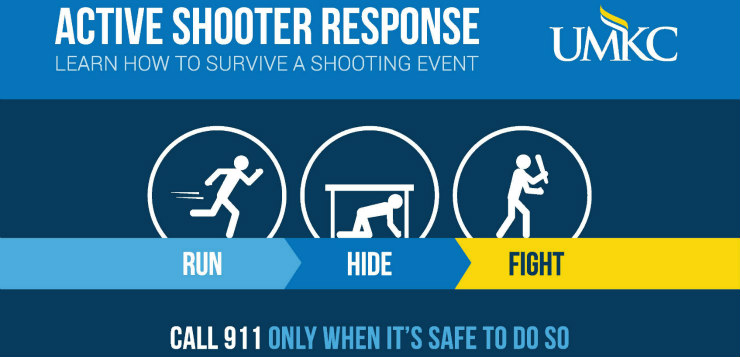Hours after Lea Morvan arrived in the United States, the once distant issue of mass shootings quickly became a reality.
“If you ever get shot, that’s the hospital we’ll take you to,” her host family said as they drove her home from the airport.
Since moving to the United States, Morvan, like other international students at UMKC, has dealt with this newfound threat of a killer entering a public place and deciding the fate of strangers based solely on their location at a moment in time. For non-Americans, the problem of mass shootings is largely foreign.
“This type of thing is not something that we are familiar with, but we hear about it a lot,” said Morvan, who is from France. “This is something that America has become known for back home.”
For those who haven’t been raised in an American culture ripe with a seemingly endless stream of mass shooting coverage, the unfamiliar threat is uniquely terrifying. Morvan recalls an anxious farewell from loved ones when she left France in 2018.
“When I told my family and friends that I was moving here for school, one of the first things they told me was how worried they were that I would get shot, especially since I spend so much of my time in a school,” said Morvan.
The anxiety intensifies when an actual shooting occurs.
“My family calls me when they hear about a shooting, even if it’s in a different state. They worry because they know that in this country, shootings are very real and there’s nothing they can do to protect me from that,” said Morvan. “What must it feel like to have to raise your children with that fear? Or grow up fearing that? I wonder that a lot.”
Ofure Musa-Agboneni, a Nigerian international student who has been in the U.S. since she started her undergraduate degree at UMKC in 2014, often fears for her own safety when in public places.
“I worry that I would be in the [wrong] place at the wrong time,” said Musa-Agboneni. “I went to Walgreens the other day to take a passport photograph and saw the man next to me tuck a gun into his waistline. I was so horrified. Why do you need a gun to go into a convenience store?”
The fear is great enough at times that Musa-Agboneni chooses to avoid certain places.
“I don’t go out to First Fridays anymore. I hardly come out at night, and when I go to the movies, I say a prayer to God to protect me until I’m back home,” said Musa-Agboneni.
Anisha Ghimire, an international student from Nepal, has tried not to let her fear surrounding shootings affect her experience at UMKC.
When considering the cause of the problem and comparing the frequency of mass shootings in the United States to that of their own respective home-countries, Ghimire, Morvan, and Musa-Agboneni each noted the same major difference: gun laws.
“America has a culture where guns are ubiquitous, and gun use is encouraged,” said Morvan. “Back home, civilians don’t have access to guns. Firearms are weapons that our police use to protect us, if need be. I’m not actually sure if there’s a legal path to acquiring firearms in France. It’s just not the concern of civilians; we have no business knowing that.”
Musa-Agboneni says although the U.S. is “the land of the free,” the freedom it gives is not always a blessing.
“I believe one of the biggest reasons the U.S. has this problem is because of the right to bear arms,” Musa-Agboneni said.
Notably, the enrollment rate of international students at UMKC has fallen 10% in the last three years, from 1,235 students in the fall of 2017 to 1,109 in the fall of 2019.
“Obviously, it scared me when I heard about mass shootings, but I don’t get worried,” said Ghimire. “Life happens, and we just need to be careful when we are going out. We can’t stay at home doing nothing and getting scared about shootings.”
ljk6f4@mail.umkc.edu








